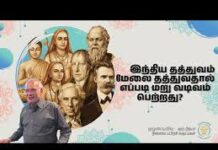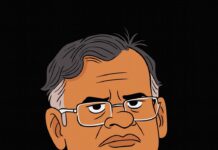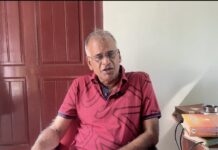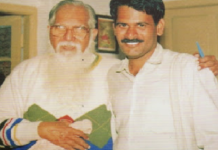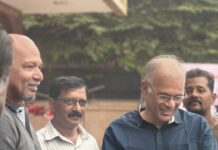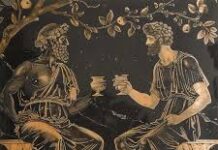
Dear Jeyamohan,
Just one question. Why are you still clinging to Hinduism? Don’t you think this is ruining your image as a modern literary and contemporary intellectual? Don’t you understand that this is the only reason people are attacking you?
Shiva Maragathalingam
Dear Shiva,
I understand why these individuals are targeting me. A thug assaulted me in 2019 over a trivial matter. Many individuals enthusiastically welcomed and celebrated the incident. A senior-level computer technician discovered the real identities of those people on the internet and sent them to me. Surprisingly, the vast majority were religious minorities. A few were political goons. There were plenty of fake IDs of people I knew.
In India, a’modern’ writer has to embrace certain ideologies today. One is left-wing politics. European liberalism is another example. Third, postmodern scepticism. No matter who one is in one’s personal life, one should present these ideals in his writing. He should use the same criteria to assess others. I personally know many famous writers from Tamil Nadu. In their private lives, they upheld a strong religious faith yet manifested themselves as one of these three ideologies. Just observe the manner in which their children’s marriage ceremonies unfolded. (Many kept them secret, too.)
Today, political parties control universities and media in India. Left-wing politicians have dominated academia and the media for a long time. Lately, our universities are slowly moving towards religious politics. Therefore, leftist politics has become increasingly aggressive. It is not easy for a writer to resist such powers. Another factor is that European liberalism and postmodern scepticism form the foundation of the literary theories that dominate academia and the literary environment. We respect literary works only when they align with these principles. As a result, writers pretend to rely on one of these three ideologies.
In this environment, writing based on Indian tradition and Hindu wisdom faces major challenges. Indian academic and literary contexts lack the modern literary principles necessary for evaluating this kind of writing. Here, most of the people who work according to tradition and Hindu religion are conservative. Many have become religious fundamentalists today. They do not understand modern literature, and even if they do, they do not like it. They expect writing based on Indian tradition and Hindu philosophy to be conservative or fundamentalist. Otherwise, they will resist.
On the other side, the leftists here believe that both Indian tradition and Hindu wisdom are overall reactionary. They have accepted the European superiority complex, which is the core component of Marxism. They are slaves to political ideology, and they cannot think further. They label anyone as a conservative or a fundamentalist, even if he has a little dependence on Indian tradition or Hindu philosophy.
Therefore, writing about Indian tradition, or Hinduism, is considered a form of suicide in the Indian context. Standing alone and facing the constant slander and stigmatisation is the only way to function here. Our writing will become distorted. Our personality will be destroyed. We are in opposition to both the Hindu political side and the progressive and liberal side of contemporary thought. Knowing this, I present the Indian tradition of Hindu wisdom.
I have no choice. I can only share the truths I have discovered throughout my life. If they defame or abuse me for it, I must confront them. If they imprison or kill me for that, I must accept it. That is how writers have acted at all ages.
I have suffered severe losses in my personal life. I reached a deep philosophical crisis. As a hermit, I wandered all over India. I renounced my whole life and pursued my questions. I found something worthy. They are based on Indian tradition and Hindu philosophy. I’m writing only to express them. I found a variety of teachers during my wandering period. I saw Guru Nitya Chaitanya Yati. The guidance I received from them helped me find my vision.
When I present myself, I don’t care what anyone says about me. Let me explain again and again. I am against religious fundamentalism. I don’t accept religious orthodoxy. I am a non-religious individual. I am not a traditional believer. I do not perform any rituals. I am not presenting the answers in my works; I am presenting only my quest. In any case, I do not accept any political ideologies because they are impediments to free thinking and spirituality. My quest is basically philosophical and spiritual. I know only a few can understand this in India. Enough of them. It’d be great if more people read it in the future.
Any religion is practically superstitious, ritualistic, and conservative. Because it has been here for a long time. Any religion can be used by fundamentalists. But religion is very primitive, and it is human history itself. There is a spirit in religion that has existed from the Stone Age to today. That core is not dependent on religious organizations. It is free and enigmatic. It lurks in our unconscious, and we can express and understand it only through metaphors. These metaphors remain in religion only. It forms our inner self. Artists and thinkers cannot spare it. That is the fertile ground of knowledge and creativity. I depend on that inner plain. I present the same. I try to separate it from religious superstitions, rituals, conservatism, and fundamentalism.
I found a rare herb for my disease. I am presenting it to the world. Some people here say that the herb has thorns and should be thrown away. They argue that it is only a thorny bush. I am saying, no, it is life-saving medicine too. Let’s remove the thorn and take the medicine. Because it is the herb that saved my life.
Jeyamohan
